人教版八年级英语重难点
人教版英语八年级上册Unit 5 重难点知识归纳总结
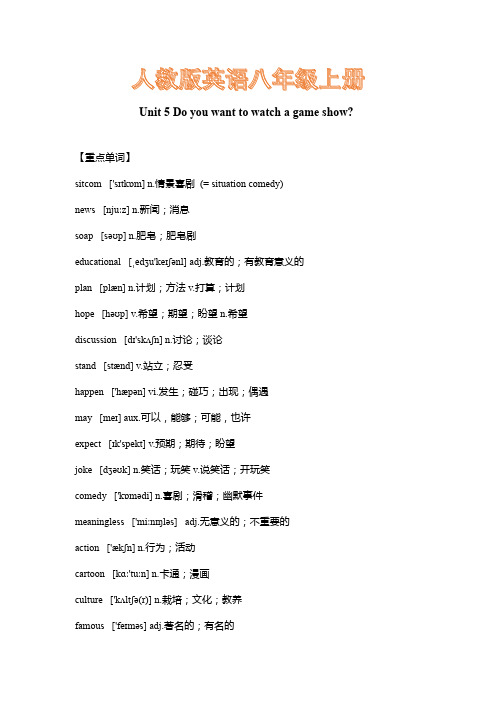
Unit 5 Do you want to watch a game show?【重点单词】sitcom ['sɪtkɒm] n.情景喜剧(= situation comedy)news [njuːz] n.新闻;消息soap [səʊp] n.肥皂;肥皂剧educational [ˌedʒu'keɪʃənl] adj.教育的;有教育意义的plan [plæn] n.计划;方法v.打算;计划hope [həʊp] v.希望;期望;盼望n.希望discussion [dɪ'skʌʃn] n.讨论;谈论stand [stænd] v.站立;忍受happen ['hæpən] vi.发生;碰巧;出现;偶遇may [meɪ] aux.可以,能够;可能,也许expect [ɪk'spekt] v.预期;期待;盼望joke [dʒəʊk] n.笑话;玩笑v.说笑话;开玩笑comedy ['kɒmədi] n.喜剧;滑稽;幽默事件meaningless ['miːnɪŋləs]adj.无意义的;不重要的action ['ækʃn] n.行为;活动cartoon [kɑː'tuːn] n.卡通;漫画culture ['kʌltʃə(r)] n.栽培;文化;教养famous ['feɪməs] adj.著名的;有名的appear [ə'pɪə(r)] vi.出现;出版;显得become [bɪ'kʌm] v.变成;成为rich [rɪtʃ] adj.富有的;富饶的;丰富的successful [sək'sesfl] adj.成功的;圆满的might [maɪt] aux.可能;也许;may的过去式main [meɪn] adj.主要的;最重要的reason ['riːzn] n.原因;理由film [fɪlm] n.电影unlucky [ʌn'lʌki]adj.倒霉的;不幸的;不吉利的lose [luːz] vt.丢失;失败vi.失败ready ['redi] adj.准备好的;乐意的character ['kærəktə(r)] n.个性;品质;人物;simple ['sɪmpl] adj.简单的;朴素的;单纯的;笨的army ['ɑːmi] n.军队;陆军;一大批action movie 动作片【重点短语】1. find out 查出/发现2. be ready to do 愿意迅速做某事3. dress up 装扮/乔装打扮4. take one's place 代替/替换5. do a good job 工作干得好/做得好6. think of 想到/思考7. game show 游戏节目8. learn from 向……学习9. talk show 访谈节目10. soap opera 肥皂剧11. go on 继续12. watch a movie 看电影13. one of… ……其中之一14. try one’s best to =do one’s best to 竭尽全力15. a pair of 一双16. as famous as 与……一样闻名/出名17. look like 看起来像18. around the world 世界各地19. have a discussion about 讨论……20. one day 有一天/某一天21. such as 例如22. a symbol of 一个……的象征/标志23. something enjoyable 快乐的事情24. interesting information 有趣的信息【重点句型】1. Some people might ask how this cartoon animal became so popular.有些人可能会问这个卡通动物是怎样变得如此受欢迎的呢。
人教版初中八年级英语各单元重点
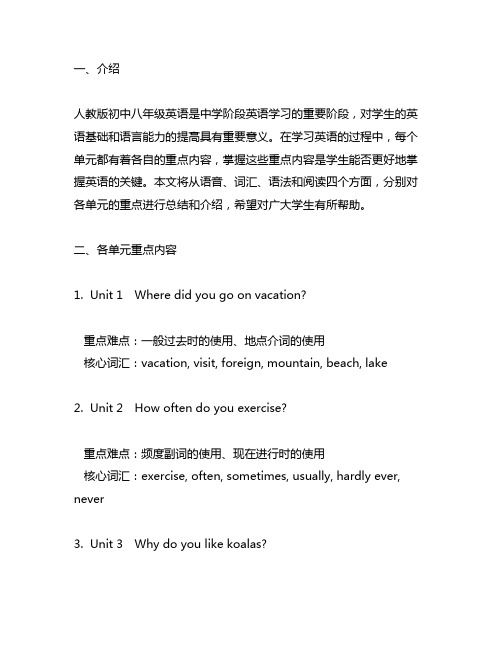
一、介绍人教版初中八年级英语是中学阶段英语学习的重要阶段,对学生的英语基础和语言能力的提高具有重要意义。
在学习英语的过程中,每个单元都有着各自的重点内容,掌握这些重点内容是学生能否更好地掌握英语的关键。
本文将从语音、词汇、语法和阅读四个方面,分别对各单元的重点进行总结和介绍,希望对广大学生有所帮助。
二、各单元重点内容1. Unit 1 Where did you go on vacation?重点难点:一般过去时的使用、地点介词的使用核心词汇:vacation, visit, foreign, mountain, beach, lake2. Unit 2 How often do you exercise?重点难点:频度副词的使用、现在进行时的使用核心词汇:exercise, often, sometimes, usually, hardly ever, never3. Unit 3 Why do you like koalas?重点难点:形容词性物主代词的使用、困难的句型whether引导的宾语从句核心词汇:koala, kangaroo, rmend, smart, cute4. Unit 4 I used to be afraid of the dark.重点难点:used to和be used to的区别、情态动词could的使用核心词汇:afraid, dark, thunder, storm, alone5. Unit 5 Do you want to watch a game show?重点难点:情态动词must的使用、陈述疑问句和特殊疑问句的变化核心词汇:game show, meaning, message, refuse, shelf6. Unit 6 I'm going to studyputer science.重点难点:一般将来时的使用、特殊疑问句和选择疑问句核心词汇:study, science, choice, voice, noise7. Unit 7 Will people have robots?重点难点:一般将来时的使用、被动语态的使用核心词汇:robot, scientist, hero, electricity, possible8. Unit 8 How do you make a banana milk shake?重点难点:祈使句的使用、过去进行时的使用核心词汇:banana, milk, shake, sugar, honey9. Unit 9 Can youe to my party?重点难点:情态动词can的使用、祈使句的变化核心词汇:party, concert, advise, worry, dish10. Unit 10 Where did you go on vacation?重点难点:比较级和最高级的用法、连词because和because of 的区别核心词汇:exciting, boring, noisy, interesting, expensive 三、总结学习初中八年级英语,熟练掌握各单元的重点内容对于学生来说至关重要。
人教新目标八年级英语上册重难点知识点归纳
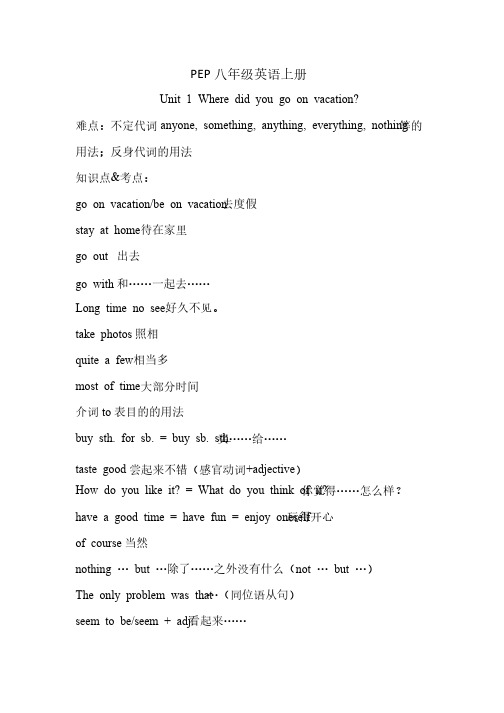
PEP八年级英语上册八年级英语上册Unit 1 Where did you go on vacation? 难点:不定代词anyone, something, anything, everything, nothing等的用法;反身代词的用法用法;反身代词的用法知识点&考点:考点:go on vacation/be on vacation 去度假去度假stay at home 待在家里待在家里待在家里go out 出去出去go with 和……一起去……和……一起去……Long time no see. 好久不见。
好久不见。
take photos 照相照相quite a few 相当多相当多相当多most of time 大部分时间大部分时间大部分时间表目的的用法介词to表目的的用法buy sth. for sb. = buy sb. sth. 买……给……买……给……taste good 尝起来不错(感官动词+adjective)How do you like it? = What do you think of it? 你觉得……怎么样?你觉得……怎么样?have a good time = have fun = enjoy oneself玩得开心玩得开心of course 当然当然nothing …but …除了……之外没有什么(not …but …)…)The only problem was that …(同位语从句)…(同位语从句)seem to be/seem + adj. 看起来……看起来……keep a diary 记日记记日记记日记 + at + 小地点小地点小地点arrive + in + 大地点大地点大地点 decide to do 决定做某事决定做某事决定做某事 try doing sth. 尝试做某事尝试做某事尝试做某事 try to do sth. 尽力做某事尽力做某事feel like 感觉到感觉到 feel like + n./ v-ing 想要……想要……ride … to …骑……到………骑……到……许多的:a lot of + 可数名词可数名词 lots of + 可数可数or 不可数名词不可数名词 I wonder that …我想知道………我想知道………我想知道…… in the past 在过去在过去在过去 enjoy doing sth. 享受做某事享受做某事享受做某事 walk around 到处逛逛到处逛逛感叹句:What + 冠词冠词 + adj. + n. + (it is) = How + adj. + 冠词冠词 + n. + (it is) start start doing doing doing sth. sth. 开始做某事开始做某事 stop stop doing doing doing sth. sth. 停止做某事停止做某事 finish finish doing doing sth. 结束做某事结束做某事because & so (不可同用)(不可同用)(不可同用) wait for …等待………等待……because of + n. a little/ a few 一些(两者的区别,以及与little/few 的区别)的区别) enough + n. / adj. + enough as + adj./adv. + as 和……一样……和……一样……one bowl of …一碗………一碗……along the way 沿着这条路沿着这条路沿着这条路 时间段+ later = after + 时间段……之后时间段……之后other, others, the other, the others, another on trip 在旅途中在旅途中find out 找到,找出找到,找出 / find 寻找寻找 / look for 寻找寻找寻找 so + adj. + that + 从句如此……以致……从句如此……以致……tell sb. (not) to do sth. 告诉某人(不要)做某事告诉某人(不要)做某事keep doing sth. / go on doing sth. 继续做某事继续做某事keep sth. + adj. 使……保持……状态使……保持……状态up and down (人)来来往往;(人)来来往往;(物)上上下下(物)上上下下in excitement = excitedly 兴奋地兴奋地come up / come out / come on / come in forget to do sth. 忘记做某事忘记做某事 forget doing sth. 忘记做过某事忘记做过某事忘记做过某事 like / dislike + n. / v-ing 喜欢/不喜欢某物/做某事做某事something + adj. ……的事情……的事情……的事情 Why not + v. = Why don ’t you + v. 为什么不……呢?为什么不……呢?Unit 2 How often do you exercise? 重点:1. How often 句型的运用;2. 2. 六个频度副词六个频度副词never, hardly ever, sometimes, sometimes, often, often, often, usually, usually, usually, always always 的差异、理解及使用;3. 频率数词once, twice 等的认识和运用;4. 一般现在时不同人称谓语形式的变化及一般疑问句的问答。
人教版英语八年级上册《Unit-3-I'm-more-outgoing-than-my-sister》单元重难点
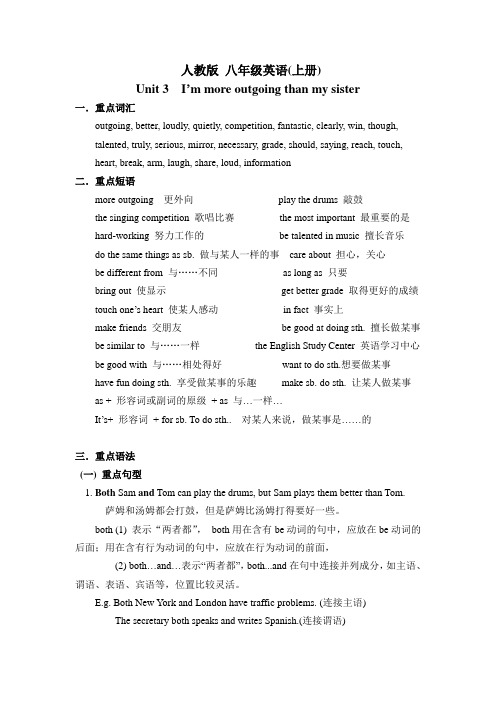
人教版八年级英语(上册)Unit 3 I’m more outgoing than my sister一.重点词汇outgoing, better, loudly, quietly, competition, fantastic, clearly, win, though,talented, truly, serious, mirror, necessary, grade, should, saying, reach, touch,heart, break, arm, laugh, share, loud, information二.重点短语more outgoing 更外向play the drums 敲鼓the singing competition 歌唱比赛the most important 最重要的是hard-working 努力工作的be talented in music 擅长音乐do the same things as sb. 做与某人一样的事care about 担心,关心be different from 与……不同as long as 只要bring out 使显示get better grade 取得更好的成绩touch one’s heart 使某人感动in fact 事实上make friends 交朋友be good at doing sth. 擅长做某事be similar to 与……一样the English Study Center 英语学习中心be good with 与……相处得好want to do sth.想要做某事have fun doing sth. 享受做某事的乐趣make sb. do sth. 让某人做某事as + 形容词或副词的原级+ as 与…一样…It’s+ 形容词+ for sb. To do sth.. 对某人来说,做某事是……的三.重点语法(一) 重点句型1. Both Sam and Tom can play the drums, but Sam plays them better than Tom.萨姆和汤姆都会打鼓,但是萨姆比汤姆打得要好一些。
最新版人教版八年级英语上册unit3知识点重难点
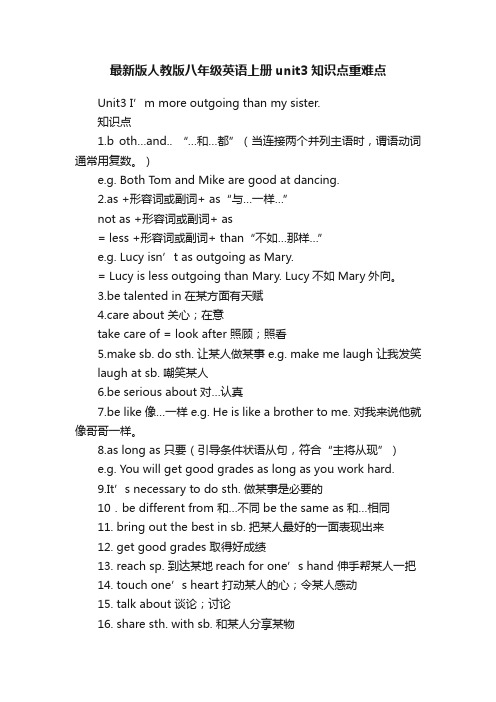
最新版人教版八年级英语上册unit3知识点重难点Unit3 I’m more outgoing than my sister.知识点1.b oth…and.. “…和…都”(当连接两个并列主语时,谓语动词通常用复数。
)e.g. Both T om and Mike are good at dancing.2.as +形容词或副词+ as“与…一样…”not as +形容词或副词+ as= less +形容词或副词+ than“不如…那样…”e.g. Lucy isn’t as outgoing as Mary.= Lucy is less outgoing than Mary. Lucy不如Mary外向。
3.be talented in 在某方面有天赋4.care about 关心;在意take care of = look after 照顾;照看5.make sb. do sth. 让某人做某事 e.g. make me laugh 让我发笑laugh at sb. 嘲笑某人6.be serious about 对…认真7.be like 像…一样 e.g. He is like a brother to me. 对我来说他就像哥哥一样。
8.as long as 只要(引导条件状语从句,符合“主将从现”)e.g. You will get good grades as long as you work hard.9.It’s necessary to do sth. 做某事是必要的10.be different from 和…不同be the same as 和…相同11. bring out the best in sb. 把某人最好的一面表现出来12. get good grades 取得好成绩13. reach sp. 到达某地reach for one’s hand 伸手帮某人一把14. touch one’s heart 打动某人的心;令某人感动15. talk about 谈论;讨论16. share sth. with sb. 和某人分享某物17. be there for sb. 随时给某人提供帮助;不离某人左右e.g. That’s why I love my father—he is always there for me.18. 辨析:①the other 特指两者中的“另一个”,one…the other…一个…另一个…;the other之后也可接数词或复数名词,特指“其他的”;e.g. He has two sons. One is a teacher, the other is a doctor.②the others特指某一范围内的“其他的人或物”,是the other 的复数形式。
人教版英语八年级上册Unit 7 重难点知识归纳总结
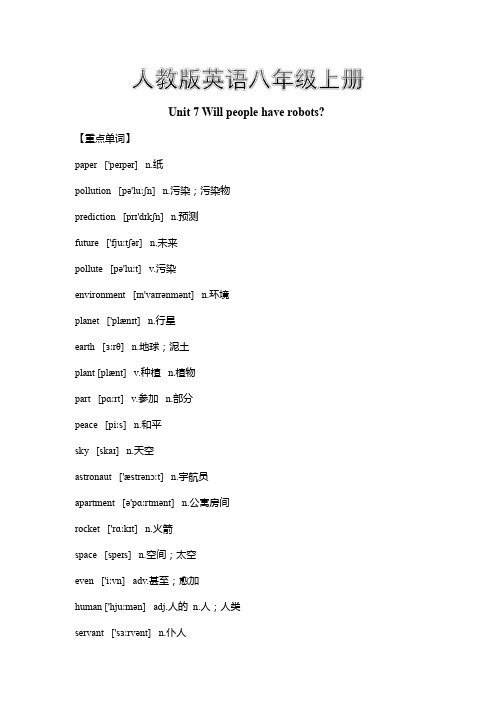
Unit 7 Will people have robots?【重点单词】paper ['peɪpər] n.纸pollution [pə'luːʃn] n.污染;污染物prediction [prɪ'dɪkʃn] n.预测future ['fjuːtʃər] n.未来pollute [pə'luːt] v.污染environment [ɪn'vaɪrənmənt] n.环境planet ['plænɪt] n.行星earth [ɜːrθ] n.地球;泥土plant [plænt] v.种植n.植物part [pɑːrt] v.参加n.部分peace [piːs] n.和平sky [skaɪ] n.天空astronaut ['æstrənɔːt] n.宇航员apartment [ə'pɑːrtmənt] n.公寓房间rocket ['rɑːkɪt] n.火箭space [speɪs] n.空间;太空even ['iːvn] adv.甚至;愈加human ['hjuːmən] adj.人的n.人;人类servant ['sɜːrvənt] n.仆人dangerous ['deɪndʒərəs] adj.危险的already [ɔːl'redi] adv.已经factory ['fæktri] n.工厂believe [bɪ'liːv] v.相信disagree [ˌdɪsə'ɡriː] v.不同意shape [ʃeɪp] n.形状fall [fɔːl] v./n.倒塌;跌倒possible ['pɑːsəbl] adj.可能的probably ['prɑːbəbli] adv.大概;或许;很可能holiday ['hɑːlədeɪ] n.假日word [wɜːrd] n.单词【重点短语】1.on computers 在电脑上2.on paper 在纸上3.live to be 200 years old 活到200岁4.free time 空闲时间5.in danger 在危险中6.on the earth 在世界上7.play a part in sth 在某方面出力/做贡献8.space station 太空站9.look for 寻找puter programmer 电脑程序员11.in the future 在将来12.hundreds of 成百上千的13.the same…as 与……一样14.over and over again 反复15.get bored 无聊16.wake up 醒来/唤醒17.look like 看起来像18.fall down 倒下/落下【重点句型】1. Are you kidding?你在开玩笑吧?2. Will people have robots?人们会拥有机器人吗?3. Everything will be free.一切都将是免费的。
人教版英语八年级上册Unit3 SectionA 重难点词汇及短语精讲

Unit3 SectionA 重难点词汇及短语精讲一、hard-working adj 工作努力的,辛勤的他为了成为一名努力的学生而努力学习。
He works _______ to be a ________ student.….as 和…..一样as +adj/adv +as not as/so...as 不如······eg. This room is _____ ______ _____that one.这个房间和那个房间一样大。
Tom _____ ____ _______ ____ his brother. Tom跑的和她弟弟一样快。
She isn’t as outgoing as her sister. 她不如她的姐姐外向。
例题Listening is just as______ as speaking in language learning.(上海)A importantB more importantC most importantD the most important三.singing competition 歌唱比赛英语中,动词-ing形式可以充当前置定语修饰后面的名词。
拓展:动名词修饰名词的短语:四.tell v 一词多义五. win v赢得现在分词 winning ,过去式和过去分词均为won. winner n. 获胜者;优胜者Which team won? 哪个队赢了?1〕They________the game yesterday.他们昨天赢得了那场比赛。
2〕She _____ a gold medal in the women ’s singles.她赢得了女子单打金牌。
3 We ______ them and ______ the game. 我们打败他们赢得了比赛。
例题 He always ____ the match when we play ping-pong.A beatB winC beatsD wins六.both adj. & pron. 两个;两个都放在“be 〞动词、情态动词之后,实义动词之前They are both doctors.They can both help sick people.They both work hard.e.g. Both Tom’s parents ________ __________.汤姆的父母都是医生。
人教版八年级下英语各单元重难点归纳

人教版八年级下英语各单元重难点归纳Unit 1 What’s the matter?本单元考点,重点三个:一、询问身体不适并给出建议的句型二、v.-ing形式的非谓语动词三、反身代词一、询问身体不适并给出建议的句型:(一)对“身体不适”的提问:“怎么了?”1、What’s the matter (with you)?2、What’s the trouble (with you)?= 3.What’s your trouble?4、What’s wrong(with you)?5、What’s up?6、What happens to you?7、What’s the problem(with you)?(二)、“身体不适”的简要表达:1、主语+ have/has + a + 病症(1) I have a cold.= I catch a cold. =I get a cold. =I have the flu.我感冒了。
I have a bad cold.我得了重感冒。
(2) I have a fever.我发烧了。
I have a high fever.我发高烧了。
(3) I have a cough.我咳嗽了。
(4) I have a nosebleed.我出鼻血了。
2、主语+ have /has + a + 身体部位-ache(1) I have a toothache.我牙疼。
I have a bad toothache.我牙疼的厉害。
(2) I have a stomachache.我胃疼。
(3) I have a headache.我头疼。
(4) I have a backache.我后背疼。
3、主语+ have/has + a + sore + 发病部位(1) I have a sore back.我后背疼。
(2) I have a sore throat.我嗓子疼。
I have a very sore throat.我嗓子疼的厉害。
- 1、下载文档前请自行甄别文档内容的完整性,平台不提供额外的编辑、内容补充、找答案等附加服务。
- 2、"仅部分预览"的文档,不可在线预览部分如存在完整性等问题,可反馈申请退款(可完整预览的文档不适用该条件!)。
- 3、如文档侵犯您的权益,请联系客服反馈,我们会尽快为您处理(人工客服工作时间:9:00-18:30)。
人教版八年级英语的难点和重点可能包括以下几个方面:
难点:
1.语法:八年级的语法相较于七年级更为复杂,包括动词时态(如
过去进行时、将来时等)、复合句、被动语态等,这些内容对于学生来说可能较难理解和运用。
2.词汇:八年级的词汇量明显增大,生词更多,词义更复杂,需
要学生花费更多的时间和精力去学习和记忆。
3.阅读理解:八年级的阅读材料篇幅更长,内容更深入,需要学
生具备更高的阅读能力和理解能力。
4.写作:八年级的写作要求相较于七年级更高,要求学生能写出
结构完整的文章,并具备一定的表达能力。
重点:
1.词汇和语法:这些是英语学习的基石,需要学生熟练掌握。
2.阅读和写作:这是英语学习和考试的重点,需要学生多加练习。
3.实际应用:学习英语的目的在于实际应用,因此学生应注重培
养自己的听、说、读、写能力。
